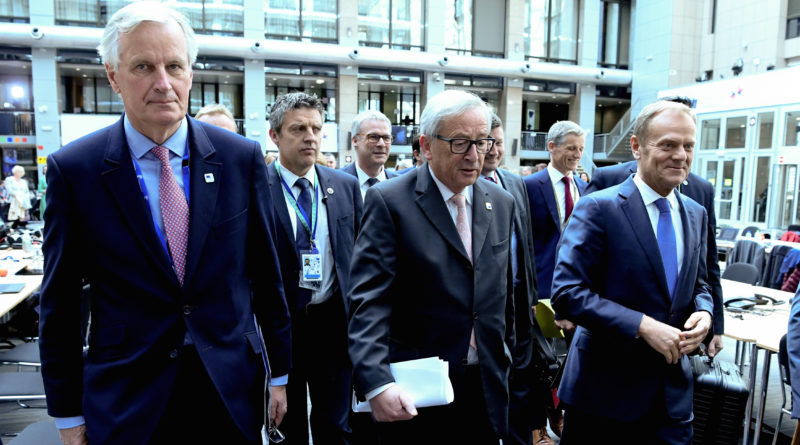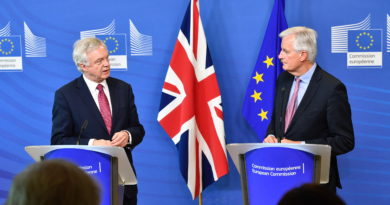The 10 key points of EU’s Brexit position
The European Union has set out its position for Brexit talks. On April 29, the leaders of the EU27 (all EU countries minus the UK) adopted the political guidelines for the negotiations. The European Commission then developed more detailed directives. Here are the 10 key points for the EU and how they are seen from the UK.
1. Negotiation in two phases. The EU wants Brexit talks to take place in two stages. The first will focus on the terms of exit. When “sufficient progress” will be made on this, discussions can start on the future relationship. Article 50 of the Treaty on the European Union requires that the framework for the future relationship is taken into account in the withdrawal arrangements, but a new agreement can only be finalised once the UK has become a third country. The EU believes this is the most efficient approach given that negotiations must be completed and approved by March 2019. The UK, instead, would want to negotiate both the exit and the future relation at the same time. From the UK perspective, it will be difficult to agree issues such as a payment to the EU without having secured some form of future trade agreement. ↔
2. Citizens’ rights. The top priority for the EU is securing the rights of EU citizens living in the UK and Britons in the EU27. The EU wants these 4.5 million individuals and their families to maintain their current rights for the lifetime. This is not just about residence, but involves pensions, social security, family aggregation, access without discrimination to the labour market, recognition of qualifications and more. The British government stated in its Brexit white paper that it intends to guarantee EU citizens’ status, but recent reports revealed resistance to accept some of the current rights, especially with regard to spouses and family members who are not from the EU. British law is more restrictive than EU directives in this regard. ↔
3. Paying the dues. The second priority for the EU is the settlement of financial obligations matured by the UK as a EU member. This is about commitments made in relation to multiannual projects on research, education, business and infrastructure, but also salaries and pensions of EU staff. The EU says there should be a single financial settlement. The exit agreement should define the way to calculate it and the modalities of payment (in euros). The EU Commission chief Brexit negotiator, Michel Barnier, insisted: “This is not a punishment. There is no Brexit bill. It is only about settling the accounts. It is a matter of responsibility.” No figure has formally been put on the table, but amounts circulated informally range between 40 and 100bn euros. The UK Brexit Secretary said Britain won’t pay 100bn, but has not ruled out a payment. ↓
4. Northern Ireland peace agreement. The EU wants to preserve the commitments set out in the Good Friday Agreement for peace and reconciliation in the island of Ireland, which is related to EU Treaties. The objective is also to avoid the creation of a hard border between the Republic and Northern Ireland. The British government agrees, but practicalities have to be determined. ↑
5. Legal certainty for trade. The EU wants to avoid a legal vacuum and proposes that goods placed on the market under EU law should remain so until they reach the end user. The UK always said it intends to avoid disruptions for businesses. ↑
6. Settlement of disputes. Like all international agreements, the Brexit deal should contain mechanisms for its enforcement and the settlement of disputes. According to the EU, the jurisdiction of the European Court of Justice should be maintained for disputes arising from the continued application of EU law, if they are about citizens’ rights or are related to the agreement itself. For other provisions, an alternative dispute settlement could be envisaged. The problem here is that the UK no longer wants to be subject to the jurisdiction of the European Court of Justice. ↓
7. Transitional period. The date of entry into force of the Brexit agreement should be at the latest 30 March 2019 at 00:00 (Brussels time), unless an extension period is agreed, EU documents say. Transitional arrangements will have to be clearly defined and limited in time. In its white paper the British government mentioned a “phased process of implementation” and said the UK “will not seek some form of unlimited transitional status.” ↑
8. Transparency. The EU wants negotiations to be conducted transparently, also because of a duty to inform EU countries, institutions and citizens. According to media reports, the UK would prefer a more secretive approach. ↔
9. Single package. The EU position is “nothing is agreed until everything is agreed”: individual items cannot be settled separately. Maintaining EU unity is also crucial, so there won’t be separate negotiations between individual countries and the UK. The expectation is that the UK will try to break this unity. ↔
10. Third countries. The EU position says that “a constructive dialogue should be engaged as early as possible with the United Kingdom on a possible common approach towards third country partners, international organisations and conventions in relation to the international commitments contracted before the withdrawal date.” With regard to trade, the UK has signalled the intention to discuss agreements with third countries before the formal EU exit. This raised questions in Brussels on its participation in EU meetings where confidential information about trade agreements is shared. ↔
The General Affairs Council (representing EU countries) should approve the EU Commission negotiating mandate on May 22. Talks will start after the UK elections of June 8.
Claudia Delpero © all rights reserved.
Photo: EU special summit on 29 April 2017: Michel Barnier, EU Commission president Jean-Claude Juncker and EU Council president Donald Tusk. © European Union , 2017 / Source: EC – Audiovisual Service.
.






